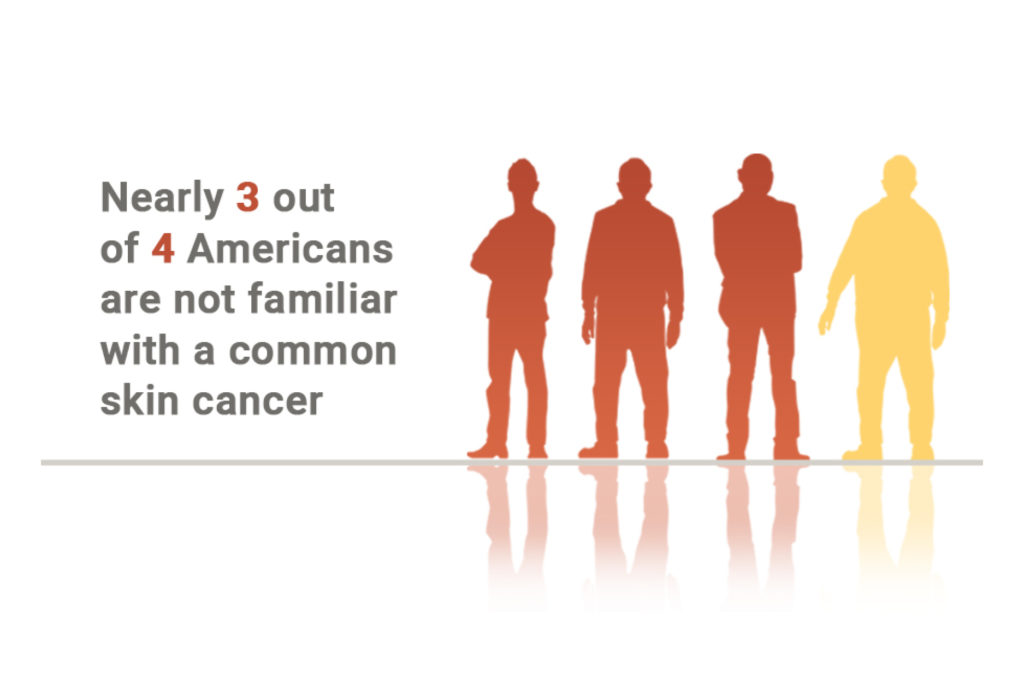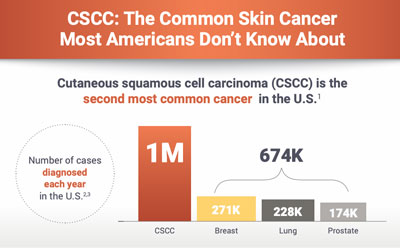Cutaneous squamous cell carcinoma (CSCC, also called squamous cell carcinoma of the skin) is the second most common form of skin cancer and five times more prevalent than melanoma in the U.S.1-3 That adds up to an estimated 1.8 million cases diagnosed every year – or 205 cases every hour.2 While CSCC is usually easy to treat when caught early, approximately 40,000 cases each year progress to advanced stages, when the cancer spreads or recurs and becomes difficult to treat.2,4 At this point, CSCC can become life-threatening.
Despite how often CSCC occurs, many Americans don’t seem to know much about it, especially in comparison to melanoma. A new survey, commissioned by The Skin Cancer Foundation in coordination with Regeneron and Sanofi, and conducted online by The Harris Poll in May 2019, revealed about 3 out of 4 Americans (74 percent) are unfamiliar with CSCC. And among those who have heard of the disease, many are unaware that it can potentially progress and become life-threatening.5
It’s time to change the status quo. All year round, get familiar with CSCC by visiting the resources on our site:
Have more questions? Be sure to schedule an appointment to talk to your doctor.
Striking survey findings include:
- 42 percent of Americans have never heard of CSCC, compared to only 11 percent who have never heard of melanoma.
- Only 3 percent of Americans correctly identified CSCC as one of the three most common types of cancer in the U.S. (The other two are basal cell carcinoma and breast cancer.)6,7
- More than half of Americans (54 percent) falsely believe melanoma is the most common type of skin cancer in the U.S., when actually CSCC is five times more prevalent2,3(and BCC is the most common type of skin cancer4).
- A majority of Americans (58 percent) know advanced melanoma can be life-threatening, yet only 28 percent think the same about nonmelanoma skin cancers such as advanced CSCC. Even among people who have heard of CSCC, only 37 percent know that advanced CSCC can be life-threatening.
Don’t Miss the News
Read the full press release on the survey findings. View Here
Survey Results Summary
Want the full results of the survey? Download Here
Data in Pictures
Download and share to help America get familiar with CSCC. View Infographic
The CSCC awareness survey was conducted online by The Harris Poll between May 2 – 22, 2019 among 2,010 adults ages 18 and older in the U.S. Raw data were weighted where necessary by age within gender, race/ethnicity, region, education, income, size of household, marital status, employment status, internet usage and propensity to be online to bring them in line with their actual proportions in the population.
- Howell JY, et al. Cancer, Squamous Cell, Skin. [Updated 2017 Oct 6]. In: StatPearls [Internet]. Treasure Island (FL): StatPearls Publishing; 2017 Jun.
- Mansouri B, Housewright C. The treatment of actinic keratoses—the rule rather than the exception. J Am Acad Dermatol2017; 153(11):1200. doi:10.1001/jamadermatol.2017.3395.
- Skin Cancer. American Academy of Dermatology. https://www.aad.org/media/stats/conditions/skin-cancer
- What are basal and squamous cell skin cancers? American Cancer Society. http://www.cancer.org/cancer/skincancer-basalandsquamouscell/detailedguide/skin-cancer-basal-and-squamous-cell-what-is-basal-and-squamous-cell. Accessed June 9, 2019.
- CSCC Misperceptions Survey. Conducted by Harris Poll for The Skin Cancer Foundation, May 2019.
- Cancer Facts and Figures 2019. American Cancer Society. https://www.cancer.org/research/cancer-facts-statistics/all-cancer-facts-figures/cancer-facts-figures-2019.html. Accessed June 9, 2019.
- Key statistics for basal and squamous cell skin cancers. American Cancer Society. https://www.cancer.org/cancer/basal-and-squamous-cell-skin-cancer/about/key-statistics.html







